| Srl | Item |
| 1 |
ID:
132939
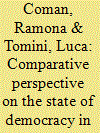

|
|
|
|
|
| Publication |
2014.
|
| Summary/Abstract |
The scholarship on Central and Eastern European politicsand societies is well established in the literature. Over the past two decades, scholars have addressed a variety of topics including the role of civil society in transition and democratic consolidation (Linz & Stepan 1996a, 1996b; P?ibá? & Young 1999; Pridham 2001; Pollack & Wielgohs 2004); the process of institution-building and the functioning of institutions (Karp 1994; Zielonka 2001; Malova & Haughton 2002); the development of political parties and their contribution to democracy (Kitschelt 1992; De Waele 1999; Lewis 2001, 2008; Hough 2005; Deegan-Krause & Haughton 2010; Burnell & Gerrits 2010); the role of external actors in the process of consolidation of democracy, and in particular the role of the EU and the enlargement process (Papadimitriou 2002; Dimitrova 2004; Schimmelfennig & Sedelmeier 2005; Vachudova 2005; Epstein & Sedelmeier 2009; Morlino & Sadurski 2010; O'Brennan 2011); populist parties (Mudde 2007; De Waele & Pacze?niak 2010; Pankowski 2011) and the ambiguous role of nationalism (Latawski 1994; Auer 2004); the problem of the rights of ethnic, linguistic, religious and national minorities (Taras 1998; Rechel 2009); the relationship between justice and politics (Anderson et al.2005; Coman & De Waele 2007; Coman 2009; Piana 2010); the construction of a market economy and the relationship between democracy and economic policies (Jeffries 1996; Stark & Bruszt 1998; Hasselman 2006; Myant & Drahokoupil 2010); political cultures (Pollack 2003; Klingemann 2008); the problems related to corruption (Smilov & Toplak 2007; Schmidt-Pfister & Moroff 2012); and the development of regionalisation and the role of local governments (Hughes et al.2004a, 2004b; Coulson & Campbell 2007).
|
|
|
|
|
|
|
|
|
|
|
|
|
|
|
|
| 2 |
ID:
132942
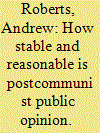

|
|
|
|
|
| Publication |
2014.
|
| Summary/Abstract |
The quality of democracy depends on both politicians and citizens. While most attention has focused on politicians, this paper looks at citizens. There has been some scepticism about whether the postcommunist public is prepared to rule their countries. The legacies of communism and the rigours of the transition may have produced citizens whose opinions are unstable and ill-informed and therefore a poor basis for democratic policy making. This paper tests this proposition by considering the nature of public opinion in the Czech Republic. Its main conclusion is that postcommunist public opinion is more reasonable than conventional wisdom suggests. Opinions on most policies change slowly if at all and when they do change the changes are prompted more by gradual shifts in mores than by political manipulation. This suggests that citizens in the region are prepared to have a significant voice in policy making.
|
|
|
|
|
|
|
|
|
|
|
|
|
|
|
|
| 3 |
ID:
132938
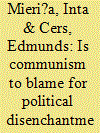

|
|
|
|
|
| Publication |
2014.
|
| Summary/Abstract |
In this article, we apply a new, original technique of cohort analysis to test empirically whether political disenchantment in the post-communist countries of Central and Eastern Europe can be linked to the previous political culture. On the basis of International Social Survey Programme 1996 and 2006 data we find a surprisingly similar and unique cohort effect in all analysed post-communist countries, reflecting persistent generational differences in perceived political competence (interest and understanding of political processes). However, the communist legacy does not seem to be important for explaining low self-efficacy or distrust in political authorities and their responsiveness to citizens' demands.
|
|
|
|
|
|
|
|
|
|
|
|
|
|
|
|
| 4 |
ID:
132945
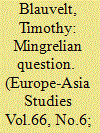

|
|
|
|
|
| Publication |
2014.
|
| Summary/Abstract |
Based on primary source materials from the Georgian Party archive and periodical press, this article examines the conflict between central and local elites in the Soviet Republic of Georgia over whether or not to grant linguistic and territorial rights to residents of one of its regions. The case demonstrates how the promises and aspirations of Soviet nationality policy were actually negotiated and interpreted on the local level in the early years of Soviet power, and how actors attempted to make use of nationality policy in order to mobilise the institutional resources available to them.
|
|
|
|
|
|
|
|
|
|
|
|
|
|
|
|
| 5 |
ID:
132941
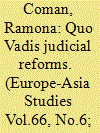

|
|
|
|
|
| Publication |
2014.
|
| Summary/Abstract |
This article examines judicial reforms in the new member states of the EU in a comparative perspective. It explores the interactions between domestic and European actors in the Czech Republic, Poland, Hungary, Romania and Bulgaria and explains why the EU has had a differential impact on the way the principle of judicial independence has been implemented nationally. The differential impact of the EU is explained by considering both the nature of EU conditionality and the relationship between the judiciary and the political actors at the domestic level. The comparison reveals that the power of the EU is greater when tensions at the domestic level between judicial and political actors increase.
|
|
|
|
|
|
|
|
|
|
|
|
|
|
|
|
| 6 |
ID:
132944
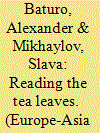

|
|
|
|
|
| Publication |
2014.
|
| Summary/Abstract |
In the absence of public information on the inner workings of the Russian political regime, especially during Medvedev's presidency, outside observers often have to rely on politicians' unguarded comments or subjective analysis. Instead, we turn to quantitative text analysis of political rhetoric. Treating governors as a quasi-expert panel, we argue that policy positions revealed in regional legislative addresses explain how elites perceived the distribution of power between Putin and Medvedev. We find that governors moved from a neutral position in 2009 to a clearly pro-Putin position in 2011, and that policy initiatives advocated by Medvedev all but evaporated from the rhetoric of governors in 2012.
|
|
|
|
|
|
|
|
|
|
|
|
|
|
|
|
| 7 |
ID:
132940
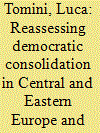

|
|
|
|
|
| Publication |
2014.
|
| Summary/Abstract |
Over the past two decades, the countries of Central and Eastern Europe have completed a long transition from authoritarian rule, and joining the EU has been considered to be an indication of the end of the consolidation process. However, this path was anything but linear and in many cases it was marked by concentration and abuse of executive power, a systematic political patronage and a plebiscitary interpretation of democracy. In order to shed light on the meaning of these phenomena, this paper provides for an analysis of democratic consolidation in these countries by way of comparing the cases of Bulgaria, Poland and Slovakia.
|
|
|
|
|
|
|
|
|
|
|
|
|
|
|
|
| 8 |
ID:
132943
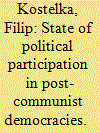

|
|
|
|
|
| Publication |
2014.
|
| Summary/Abstract |
The article assesses the state of political participation in Central and East European post-communist democracies. Incorporating the most recent data, it compares the emerging trends in political participation to those observed in the established democracies of Western Europe. The findings reveal that post-communist citizens participate substantially less than their Western counterparts, and, contrary to some expectations, no convergence has been taking place. This is due to a host of factors, the importance of which seems to vary according to the type of political activity. It is subsequently shown that while political participation is lower than in Western Europe, it is not markedly more biased. The poor state of political participation therefore does not appear to seriously undermine the quality of the post-communist democratic process.
|
|
|
|
|
|
|
|
|
|
|
|
|
|
|
|